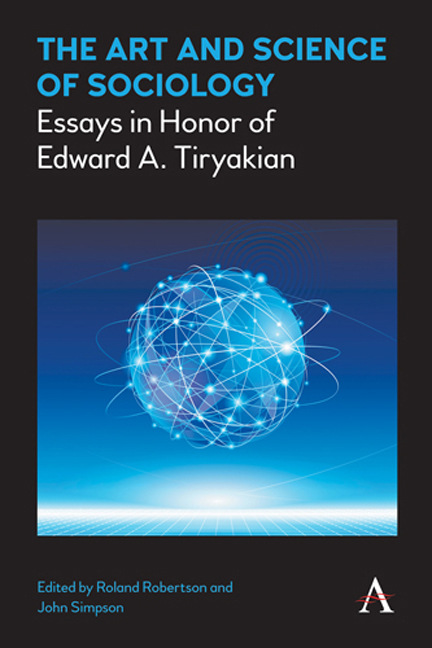Book contents
- Frontmatter
- Contents
- List of Figures and Tables
- List of Contributors
- Acknowledgments
- Introduction
- Chapter 1 The Dynamo and the Diplomat: Tiryakian's Role in Preserving Sorokin's Reputation
- Chapter 2 Edward Tiryakian and Modernization Theory: A Very Special Relationship
- Chapter 3 Developmental Path (Entwicklungsform): A Neglected Weberian Concept and Its Usefulness in the Civilizational Analysis of Islam
- Chapter 4 The Existential Sociology of Edward Tiryakian: Toward an Integrated Paradigm
- Chapter 5 Comparative Reflections on Sociology and Conservatism: The Contributions of Edward A. Tiryakian
- Chapter 6 Contemporary Changes in the Processes of Social Differentiation: Toward an Analytical Version of the Theory
- Chapter 7 Considerations on Global Studies
- Chapter 8 Honoring Edward Tiryakian as a Metasociologist: A Metaconceptual Analysis of Prosumption and Related Concepts
- Chapter 9 Dangerous Nouns of Process: Differentiation, Rationalization, Modernization
- Chapter 10 Modernization as Social Becoming: Ten Theses on Modernization
- Chapter 11 Religion and Evolution
- Chapter 12 The “Axial Age” vs. Weber's Comparative Sociology of the World Religions
- Edward A. Tiryakian's Publications
- Index
Chapter 11 - Religion and Evolution
Published online by Cambridge University Press: 22 July 2017
- Frontmatter
- Contents
- List of Figures and Tables
- List of Contributors
- Acknowledgments
- Introduction
- Chapter 1 The Dynamo and the Diplomat: Tiryakian's Role in Preserving Sorokin's Reputation
- Chapter 2 Edward Tiryakian and Modernization Theory: A Very Special Relationship
- Chapter 3 Developmental Path (Entwicklungsform): A Neglected Weberian Concept and Its Usefulness in the Civilizational Analysis of Islam
- Chapter 4 The Existential Sociology of Edward Tiryakian: Toward an Integrated Paradigm
- Chapter 5 Comparative Reflections on Sociology and Conservatism: The Contributions of Edward A. Tiryakian
- Chapter 6 Contemporary Changes in the Processes of Social Differentiation: Toward an Analytical Version of the Theory
- Chapter 7 Considerations on Global Studies
- Chapter 8 Honoring Edward Tiryakian as a Metasociologist: A Metaconceptual Analysis of Prosumption and Related Concepts
- Chapter 9 Dangerous Nouns of Process: Differentiation, Rationalization, Modernization
- Chapter 10 Modernization as Social Becoming: Ten Theses on Modernization
- Chapter 11 Religion and Evolution
- Chapter 12 The “Axial Age” vs. Weber's Comparative Sociology of the World Religions
- Edward A. Tiryakian's Publications
- Index
Summary
Robert Bellah's Religion in Human Evolution: From the Paleolithic to the Axial Age was published by Harvard University Press in September 2011 (Bellah 2011). Bellah's death in July 2013 made it the last book he wrote and published during his lifetime. Based on more than two decades of reading and research plus discussions with his Habits of the Heart coauthors (Bellah et al. 1985) and others (Bellah 2011: xxv–xxvii). Religion in Human Evolution marks the final flourish of Bellah's notable scholarly career.
To him we owe such things as his analysis of religion and the turn to modernity in nineteenth-century Japan (Bellah 1957); a twentieth-century version of the idea of civil religion and its use in understanding American society (Bellah 1967: 1–21); an elaboration of the idea of symbolic realism (Bellah 1970); and his widely cited article, “Religious Evolution” (Bellah 1964: 358–75). These and many other items constitute a major oeuvre among scholars and researchers in the sociology of religion coming of age professionally in the mid-twentieth century.
Religion in Human Evolution has been described as Bellah's magnum opus (Wolfe 2011: 1). There is no doubt that it is a book that displays a sweep of learning and an effort to organize literatures ranging over the social sciences, the humanities and the physical and life sciences. In the first part the reader is asked to consider cosmology and evolution according to Bellah. In the second part he lays out tribal and archaic religion as precursor types and then moves on to the civilizations of the Axial Age: Ancient Israel, Ancient Greece, China in the Late First Millennium BCE and Ancient India.
While not described as such, a Guttman-like progression characterizes Bellah's description of religions, from tribal to those of the Axial Age. New things appear, but nothing is lost. Tribal religion—the earliest type—is undifferentiated from the society in which it is expressed. Archaic religion entails the appearance of differentiated religious symbol systems and cultic practices, and the entwinement of meaning (god) and power (king) in stratified societies (rulers and ruled). In the Axial Age, the idea of transcendence and immanence occurs along with the force of critique that, via observation from a standpoint (usually preserved in writing), can support the persistence of imminent good or the need for change.
- Type
- Chapter
- Information
- The Art and Science of SociologyEssays in Honor of Edward A. Tiryakian, pp. 173 - 188Publisher: Anthem PressPrint publication year: 2016



